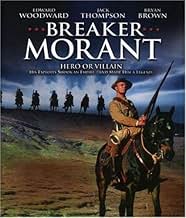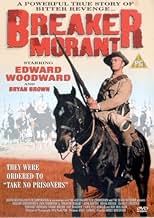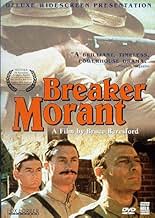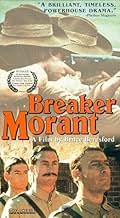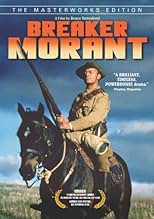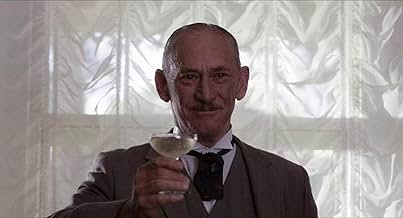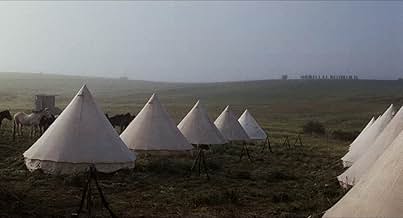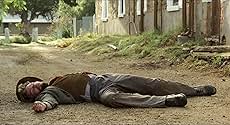Three Australian lieutenants are court martialed for executing prisoners as a way of deflecting attention from war crimes committed by their superior officers.Three Australian lieutenants are court martialed for executing prisoners as a way of deflecting attention from war crimes committed by their superior officers.Three Australian lieutenants are court martialed for executing prisoners as a way of deflecting attention from war crimes committed by their superior officers.
- Nominated for 1 Oscar
- 13 wins & 8 nominations total
Charles 'Bud' Tingwell
- Lt. Col. Denny
- (as Charles Tingwell)
Featured reviews
Edward Woodward, better known to American audiences as the Equalizer, plays the title role in this military courtroom drama set during the Boer War. Woodward who had a well known reputation as a rollicking writer of the Australian frontier was one of three men charged with murdering several prisoners during the Boer War, one of them happened to be a German missionary. That got Kaiser Wilhelm's back up and the British were not looking for intervention from him on the Boer side. One must remember that the Germans did have a presence in Africa at the time. The diplomatic situation was not unlike the Korean War before the Chinese intervened.
What to do, but find someone to take the fall. Certainly not Lord Kitchener the commander of British forces in South Africa who let it be known quite unofficially and not on paper for attribution that he really wouldn't care if Boer Prisoners were shot. Edward Woodward, Bryan Brown and young Lewis Fitzgerald, get selected for a court martial. This is not unlike the more famous incident in the French Army during World War I as depicted in Paths of Glory.
The Australians to this day feel that these men were singled out because they were Australians and not British. Wouldn't do to have His Majesty's subjects, let alone the commander be held responsible. While the Boer War was going on, the various colonies on the Australian continent coalesced and formed a nation. Why the Australian government didn't protest more vigorously is something I'm not quite understanding.
That however does not detract from Breaker Morant being the fine film it is with sterling performances all around. Jack Thompson is the defense attorney in this court martial and does a splendid job in the face of a stacked deck.
Alan Cassell is a bloodless Kitchener covering his own rear at all costs and Vincent Ball plays Sir Ian Hamilton who was Kitchener's aide at the time. Australia would meet these two later on under far worse circumstances as Kitchener was War Minister in the Asquith cabinet during World War I and Ian Hamilton was the commander-in-chief of the Gallipoli Expedition where so many ANZACS died in another foreign battlefield for another cause not really their concern. Hamilton is shown as quite the rat here, helping to cover his boss's complicity.
I recommend Breaker Morant mostly for those who are not Australian so they can acquaint themselves with a sad and bitter chapter in that nation's life.
What to do, but find someone to take the fall. Certainly not Lord Kitchener the commander of British forces in South Africa who let it be known quite unofficially and not on paper for attribution that he really wouldn't care if Boer Prisoners were shot. Edward Woodward, Bryan Brown and young Lewis Fitzgerald, get selected for a court martial. This is not unlike the more famous incident in the French Army during World War I as depicted in Paths of Glory.
The Australians to this day feel that these men were singled out because they were Australians and not British. Wouldn't do to have His Majesty's subjects, let alone the commander be held responsible. While the Boer War was going on, the various colonies on the Australian continent coalesced and formed a nation. Why the Australian government didn't protest more vigorously is something I'm not quite understanding.
That however does not detract from Breaker Morant being the fine film it is with sterling performances all around. Jack Thompson is the defense attorney in this court martial and does a splendid job in the face of a stacked deck.
Alan Cassell is a bloodless Kitchener covering his own rear at all costs and Vincent Ball plays Sir Ian Hamilton who was Kitchener's aide at the time. Australia would meet these two later on under far worse circumstances as Kitchener was War Minister in the Asquith cabinet during World War I and Ian Hamilton was the commander-in-chief of the Gallipoli Expedition where so many ANZACS died in another foreign battlefield for another cause not really their concern. Hamilton is shown as quite the rat here, helping to cover his boss's complicity.
I recommend Breaker Morant mostly for those who are not Australian so they can acquaint themselves with a sad and bitter chapter in that nation's life.
It's one of the most delightful experiences to watch a movie you know completely nothing about and it turns out to be one of the best surprises in a long time. This was the case with "Breaker' Morant". I dont even know why I bothered to watch it, since it sounded like a truly boring Australian war movie, but boy was I wrong and consequently glad I DID bother. Some of the acting and the script are truly Oscar-worthy and the photography and camera movements were truly outstanding on many occasions, taking the whole movie onto another level of experience. And not to forget, the poetry recited through the movie is brilliant. I wonder if it truly got published. 8/10
After first encountering "Breaker" Morant during a bout of insomnia in 1984 on cable, I have repeatedly come back to this film as one of my all-time classics--covering war, politics, tactics, transitions to manhood involved in all wars--and injustice.
Although set during the Boer War, the account of three officers tried for murder during a war in which the opponents were dressed as civilians has its obvious parallels to the 21st Century. It is absolutely amazing how similar a court marshal can be out on the "velt" of South Africa, in Washington, D.C., or during a purely uniformed war in which all protagonists are easily identifiable.
Three Australian volunteers for the "Bushvelt Carbineers", recruited to fight against civilian-clad commandos (reportedly the first use of the term), find themselves charged with murder, and set as an example by the British in order to prevent Germany from entering the war on the side of the Boer (Dutch) inhabitants of South Africa. In one incredulous encounter between a British officer and Lord Kitchener, the officer spouts the British line "they lack our altruism" (referring to German interests in the gold and silver mines of South Africa), to which Lord Kitchener grudgingly responds, "Quite." A sham trial from start to finish, the Australians are defended by military attorney with experience in "land conveyancing and wills" to which one of those charged, "the latter might come in handy." The film is replete with irony and tragicomic circumstances, as this "new war for a new century" presages many of the conflicts that would come later in the 20th century, and many of the clear paradoxes and trying aspects of the war against terror--again, in which one side is not uniformed, does not conduct war according to any known "rules" of "civilized warfare" (an oxymoron if ever there was one). It has lost none of its cutting edge in the 25-odd years since its release.
Although set during the Boer War, the account of three officers tried for murder during a war in which the opponents were dressed as civilians has its obvious parallels to the 21st Century. It is absolutely amazing how similar a court marshal can be out on the "velt" of South Africa, in Washington, D.C., or during a purely uniformed war in which all protagonists are easily identifiable.
Three Australian volunteers for the "Bushvelt Carbineers", recruited to fight against civilian-clad commandos (reportedly the first use of the term), find themselves charged with murder, and set as an example by the British in order to prevent Germany from entering the war on the side of the Boer (Dutch) inhabitants of South Africa. In one incredulous encounter between a British officer and Lord Kitchener, the officer spouts the British line "they lack our altruism" (referring to German interests in the gold and silver mines of South Africa), to which Lord Kitchener grudgingly responds, "Quite." A sham trial from start to finish, the Australians are defended by military attorney with experience in "land conveyancing and wills" to which one of those charged, "the latter might come in handy." The film is replete with irony and tragicomic circumstances, as this "new war for a new century" presages many of the conflicts that would come later in the 20th century, and many of the clear paradoxes and trying aspects of the war against terror--again, in which one side is not uniformed, does not conduct war according to any known "rules" of "civilized warfare" (an oxymoron if ever there was one). It has lost none of its cutting edge in the 25-odd years since its release.
Truly great drama based on a real story. The camerawork is simple & not flashy, allowing the great script & magnificent ensemble cast to shine. There isn't one weak acting performance in this film, the standouts being Jack Thompson (in my opinion, his best ever performance)& Woodward in the role of "Breaker" Morant. Gripping drama that has aged well over 23 years. A must see 9/10.
We don't see very many films or dramas on the history channel here in Britain . I know the American version shows them because American reviewers have mentioned this on this very website , but I'm not very keen on this happening over here because before you know it we might be seeing THE GREEN BERETS , BRAVEHEART and WE WERE SOLDIERS appearing on the channel , poor movies and poor history to boot in my opinion . At the weekend we were treated to BREAKER MORANT . As I said I'm not keen on the history channel transmitting feature films but I'll forgive them this time because it's a very good movie and very good history .
BREAKER MORANT is the dramatisation of a real life incident during the Boer war , the first " dirty war " of the 20th century , where three Australian officers Harry Morant , John Handcock and George Witton are on trial for their lives for the murder of boer POWs and of a German missionary . What I love about this film is that unlike a lot of other movies with an anti-war / anti- military injustice agenda is that it shows the difficult situations soldiers will always find themselves in . The men on trial are victims , victims of politics and of a wider picture . With the killing of the missionary Germany wants to intervene in the conflict on the side of the boers , not to protect the noble South African farmers from British aggression but to get their hands on the region's gold and diamond mines . In order to stop this happening the British government needs scapegoats in order to hang and Morant , Witton and Handcock were to be hung out to dry so it's the politicians of the time who are to blame for this miscarriage of justice , not the military , and it'd be interesting to note what people who campaign for pardons for the British soldiers shot for " cowardice " during the first world war make of this tale . The three characters on trial here are victims of a grave injustice but you can't help feeling because they " were only obeying orders " sympathy for them will be in short supply from a modern day perspective . I'm probably correct in saying that anyone who's served in the military can see far more clearly the injustice done than any of the " professional anti-war brigade " . BREAKER MORANT isn't a movie than can be used for anyone's hidden agenda , and for that we should be grateful
It's fairly obvious BREAKER MORANT is based upon a stage play . The central setting is a military court room with much of the story told in flashback . Director Bruce Beresford handles the action scenes very well but in this type of story the most important aspect is the cast and their acting , and the director gets the best out of his cast especially Edward Woodward ( Normally an actor I don't like ) who gives a career best performance and Jack Thompson . My only criticism of the casting is that a couple of actors playing British characters let their Aussie accents slip a little , but I'm nitpicking .
Just to sum up this is a very intelligent story of a dirty war , dirty politics and dirty justice which will appeal to serious historians and former servicemen rather than professional pacifists
BREAKER MORANT is the dramatisation of a real life incident during the Boer war , the first " dirty war " of the 20th century , where three Australian officers Harry Morant , John Handcock and George Witton are on trial for their lives for the murder of boer POWs and of a German missionary . What I love about this film is that unlike a lot of other movies with an anti-war / anti- military injustice agenda is that it shows the difficult situations soldiers will always find themselves in . The men on trial are victims , victims of politics and of a wider picture . With the killing of the missionary Germany wants to intervene in the conflict on the side of the boers , not to protect the noble South African farmers from British aggression but to get their hands on the region's gold and diamond mines . In order to stop this happening the British government needs scapegoats in order to hang and Morant , Witton and Handcock were to be hung out to dry so it's the politicians of the time who are to blame for this miscarriage of justice , not the military , and it'd be interesting to note what people who campaign for pardons for the British soldiers shot for " cowardice " during the first world war make of this tale . The three characters on trial here are victims of a grave injustice but you can't help feeling because they " were only obeying orders " sympathy for them will be in short supply from a modern day perspective . I'm probably correct in saying that anyone who's served in the military can see far more clearly the injustice done than any of the " professional anti-war brigade " . BREAKER MORANT isn't a movie than can be used for anyone's hidden agenda , and for that we should be grateful
It's fairly obvious BREAKER MORANT is based upon a stage play . The central setting is a military court room with much of the story told in flashback . Director Bruce Beresford handles the action scenes very well but in this type of story the most important aspect is the cast and their acting , and the director gets the best out of his cast especially Edward Woodward ( Normally an actor I don't like ) who gives a career best performance and Jack Thompson . My only criticism of the casting is that a couple of actors playing British characters let their Aussie accents slip a little , but I'm nitpicking .
Just to sum up this is a very intelligent story of a dirty war , dirty politics and dirty justice which will appeal to serious historians and former servicemen rather than professional pacifists
Did you know
- Trivia"We shot them under Rule 303" is a reference to the.0.303 inch (7.7 millimetre) cartridge used in British Army rifles.
- GoofsThe band plays an excerpt from Franz Lehár's The Merry Widow, which premiered three years after the trial took place.
- Quotes
[last lines]
Harry Morant: Shoot straight, you bastards. - Don't make a mess of it!
- Crazy creditsIntroducing Lewis Fitz-Gerald as George Witton.
- SoundtracksAt Last
Traditional tune
Arranged by Jack Grimsley (uncredited)
Lyrics by H.H. Morant
Performed by Edward Woodward
- How long is Breaker Morant?Powered by Alexa
Details
- Release date
- Country of origin
- Official site
- Languages
- Also known as
- 'Breaker' Morant
- Filming locations
- Cactus Farm, Burra, South Australia, Australia(deserted farmhouse, Boer attack)
- Production companies
- See more company credits at IMDbPro
Box office
- Budget
- A$800,000 (estimated)
- Gross worldwide
- $948
Contribute to this page
Suggest an edit or add missing content


